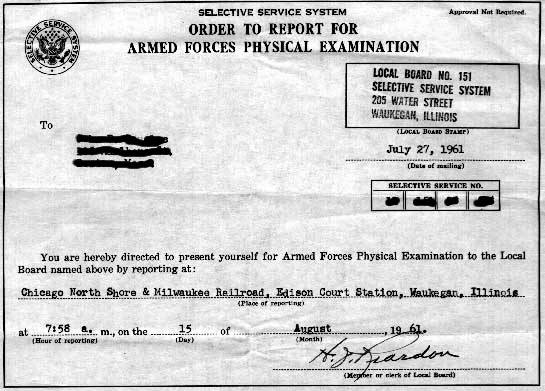1960s Draft Notice 125th Anniversary Timeline

Every young man who went to college in the 1950s and 1960s had to balance possible military service with their classes. After the Second World War ended in 1945, the US government allowed the wartime selective service law (the draft) expire. But in 1948, with Cold War tensions growing between the US and Soviet Union, the Congress passed a new Selective Service Act that required all men living in the US, between the ages of 18 and 26, to register for a possible draft. Unless a man received an exemption for physical reasons or education reasons or other forms of service, a man could be called into the military for 21 months of active service followed by 5 further years in the US Reserves. Exemptions for education were routinely granted for college students, with the expectation that most such men would do military duty after they graduated. By the early 1960s hundreds of thousands of men had served and many were still in the reserves. The system seemed to be working fine -- until 1964.
In the spring of 1964, Secretary of Defense Robert McNamara returned to the US from a fact-finding visit to South Vietnam. McNamara told President Lyndon Johnson that the South Vietnamese government would require "substantial increases" in military aid to resist communist insurgents in the nation. Johnson increased aid and then sent additional US military advisors to train Vietnamese troops. By July over 5000 US advisors were in Vietnam, some taking part in combat missions.
A few months later, during his campaign for election in 1964, Lyndon Johnson told audiences at campaign stops that some American leaders wanted to send more troops in Vietnam, but he said that "we are not about to send American boys nine or ten thousand miles away to do what Asian boys ought to do for themselves." Johnson knew that his senior commanders at the Pentagon were recommending that the US should use Air Force bombers to assist South Vietnamese troops, that trails leading into North Vietnam -- where most of the insurgents were trained and supplied -- should be bombed and that an American air base, guarded by US troops, should be built near the South Vietnamese capitol of Saigon. Johnson hoped to be able to negotiate a settlement that would prevent this, but he had given permission for American planners to prepare for bombing missions in Vietnam -- if needed.
After winning the 1964 presidential election, Johnson was aware that he might regret his perceived 'promise' to keep "America boys" out of Asia. He assured Congressional supporters and advisors that if he had to commit more troops to Vietnam that he would not call up reserve units or national guard units (for that would disrupt the economy and his domestic legislation), but would rely on drafted soldiers by doubling draft calls.
Draft exemptions for college classes now took on a new significance -- life on the American campus was about to change.
